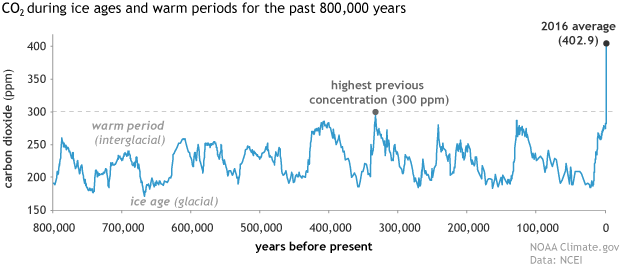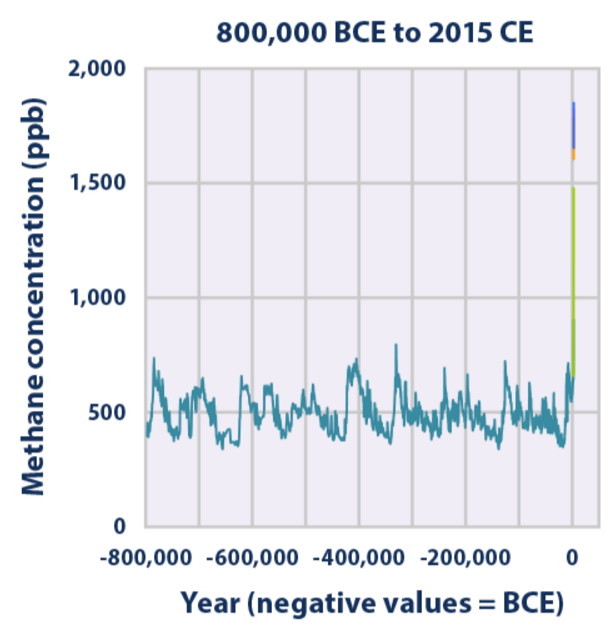Atmospheric CO2 At Record Highs
We are not making any progress towards avoiding the worst of the dire consequences of global warming.
Atmospheric carbon dioxide levels are showing a startling increase
Antarctica ice cores were analyzed producing measures for CO2 and methane over the last 800,000 years:
Methane is an even more powerful greenhouse gas than CO2, and the plot over the last 800,000 years is similar,
Atmospheric carbon dioxide levels are showing a startling increase
Atmospheric carbon dioxide concentrations have spiked more in the period from February 2015 to February 2016 than in any other comparable period dating back to 1959, according to a scientist with the National Oceanic and Atmospheric Administration’s Earth System Research Laboratory.
Pieter Tans, lead scientist of NOAA’s Global Greenhouse Gas Reference Network, confirmed that the increase, reported previously by New Scientist, represented a record year-over-year growth for Mauna Loa. He also said that in addition to the stark rise in carbon dioxide levels over the past year, researchers have now observed four straight years of increases of more than 2 parts per million in the atmosphere.
“We’ve never seen that,” Tans said. “That’s unprecedented.”
Antarctica ice cores were analyzed producing measures for CO2 and methane over the last 800,000 years:
 |
| Fig 1. minimum and maximum volume of CO2 correspond to the coldest period of ice ages and thermal maxima during interglacial periods. |
Methane is an even more powerful greenhouse gas than CO2, and the plot over the last 800,000 years is similar,
 |
| Fig 2 shows that changes in CH4 concentration (measured in parts per billion), vary between cold (285 ppb) and warm periods (700 ppb). By 2017, CH4 concentration was estimated to have reached 1860 ppb, or 267% above the normal maximum. Graphic: EPA/Wikipedia. |
Previous changes in the level of atmospheric CO2 and CH4 over the last 800,000 years have been induced by variations in Earth's orbit (called Milankovitch cycles) and have taken 10,000-15,000 years to occur. By contrast, changes above their normal maxima have occurred over the last 100-150 years – 100 times faster than the increase initiated by orbital change.[....]
We have the ability to reduce carbon emissions by imposing an effective carbon tax and electrification of transport, thereby reducing combustion of fossil fuels. However, the current state of technology suggests that even if we rapidly reduce greenhouse gas emissions over the next two decades, we may be unable to slow the onset of catastrophic climate change and sea level rise much beyond the middle of next century.And this is an understatement
Unless we take these or similar measures it may not be possible to avoid eventual onset of climate conditions and sea level rise inimical to our longer-term survival on this planet.


Comments
Post a Comment